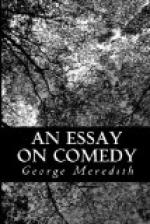Where Congreve excels all his English rivals is in his literary force, and a succinctness of style peculiar to him. He had correct judgement, a correct ear, readiness of illustration within a narrow range, in snapshots of the obvious at the obvious, and copious language. He hits the mean of a fine style and a natural in dialogue. He is at once precise and voluble. If you have ever thought upon style you will acknowledge it to be a signal accomplishment. In this he is a classic, and is worthy of treading a measure with Moliere. The Way of the World may be read out currently at a first glance, so sure are the accents of the emphatic meaning to strike the eye, perforce of the crispness and cunning polish of the sentences. You have not to look over them before you confide yourself to him; he will carry you safe. Sheridan imitated, but was far from surpassing him. The flow of boudoir Billingsgate in Lady Wishfort is unmatched for the vigour and pointedness of the tongue. It spins along with a final ring, like the voice of Nature in a fury, and is, indeed, racy eloquence of the elevated fishwife.
Millamant is an admirable, almost a lovable heroine. It is a piece of genius in a writer to make a woman’s manner of speech portray her. You feel sensible of her presence in every line of her speaking. The stipulations with her lover in view of marriage, her fine lady’s delicacy, and fine lady’s easy evasions of indelicacy, coquettish airs, and playing with irresolution, which in a common maid would be bashfulness, until she submits to ‘dwindle into a wife,’ as she says, form a picture that lives in the frame, and is in harmony with Mirabel’s description of her:
‘Here she comes, i’
faith, full sail, with her fan spread, and her
streamers out, and a shoal of fools
for tenders.’
And, after an interview:
’Think of you! To think
of a whirlwind, though ’twere in a whirlwind,
were a case of more steady contemplation,
a very tranquillity of mind
and mansion.’
There is a picturesqueness, as of Millamant and no other, in her voice, when she is encouraged to take Mirabel by Mrs. Fainall, who is ’sure she has a mind to him’:
Millamant: Are you?
I think I have—and the horrid man looks
as if he
thought so too, etc. etc.
One hears the tones, and sees the sketch and colour of the whole scene in reading it.
Celimene is behind Millamant in vividness. An air of bewitching whimsicality hovers over the graces of this Comic heroine, like the lively conversational play of a beautiful mouth.
But in wit she is no rival of Celimene. What she utters adds to her personal witchery, and is not further memorable. She is a flashing portrait, and a type of the superior ladies who do not think, not of those who do. In representing a class, therefore, it is a lower class, in the proportion that one of Gainsborough’s full-length aristocratic women is below the permanent impressiveness of a fair Venetian head.




